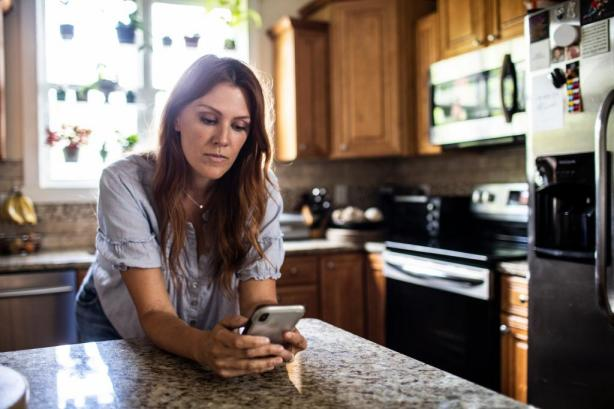
It’s time to put down your phone, especially at night.
California researchers have found that eye damage from overexposure(过度接触) to light can lead to chronic(慢性的) disease and a shorter lifespan, especially in dark places.
Professor Pankaj Kapahi, Ph.D., and Brian Hodge, Ph.D. published their findings in the Nature Communications, telling us the severity(严重性) of eye damage. “Our study shows that this is a big problem: eye damage may actually lead to problems in other organs,” Kapahi said. He and Hodge studied the patterns of fruit flies and found that overexposure to light in the eyes can cause or worsen chronic disease. Further research found that flies that were completely in darkness lived longer than those that were not, signaling that impacts on the circadian(昼夜节律的) cycle can have negative effects on lifespan.
Too much time spent in front of a screen can harm your health. “The discovery that the eye itself, at least in the fruit fly, can directly regulate lifespan came as a surprise to us,” Hodge said. “Looking at computer and phone screens and being exposed to light pollution late into the night are very harmful to us,” Kapahi explained. “It messes up eye protection, damaging the rest of the body and the brain.” Every cell in the body operates on a circadian clock, an internal 24-hour rhythm that often lasts longer than 24 hours but resets each day according to the cycle of the sun. A person’s circadian clock sets the rhythm for many important bodily functions such as sleep cycles, body temperature rhythm, eating, and digestion. Too much light can throw a person’s clock off, causing changes in many important bodily functions.
These findings are particularly concerning because screen time has increased fast for many because of COVID-19. Parents reported that children’s screen time increased from 0.75 hours to 6.5 hours a day due to online classes.
“We always think of the eye as something that serves us, to provide vision. We don’t think of it as something that needs to be protected,” Kapahi noted.
本时文内容由奇速英语国际教育研究院原创编写,未经书面授权,禁止复制和任何商业用途,版权所有,侵权必究!(作者投稿及时文阅读定制请联系微信:18980471698)
1.How did Kapahi and Hodge know the severity of eyes’ overexposure to light?
A By asking people questions about light.
B By watching programs about light.
C By reading books about sleep.
D By studying fruit flies.
解析:选D。D细节理解题。根据第三段第三句的“He and Hodge studied the patterns of fruit flies and found that overexposure to light in the eyes can cause or worsen chronic disease.”可知,Kapahi和Hodge通过对果蝇进行研究,发现眼睛过度暴露在光线下会导致或加重慢性疾病。故选D。
2.How did Kapahi and Hodge feel after knowing the eye can directly regulate lifespan?
A Enthusiastic.
B Sensitive.
C Amazed.
D Sorrow.
解析:选C。C推理判断题。根据第四段第二句的“The discovery that the eye itself, at least in the fruit fly, can directly regulate lifespan came as a surprise to us”可知,眼睛本身可以直接调节寿命的发现让Kapahi和Hodge感到惊讶。故选C。
3.What made kids’ screen time increase?
A Educational stories.
B Wonderful music.
C Online classes.
D Interesting games.
解析:选C。C细节理解题。根据第五段最后一句“Parents reported that children’s screen time increased from 0.75 hours to 6.5 hours a day due to online classes.”可知,因为要上网课,孩子每天的看屏幕时间从0.75小时增加到6.5小时。故选C。
4.What is the passage mainly about?
A We need to protect our eyes during sleep.
B Children’s screen time increased last year.
C Eye damage from screen time can be deadly.
D Overexposure to light is beneficial to chronic disease.
解析:选C。C主旨大意题。通读全文可知,本文讲了每天看屏幕时间过长对眼睛造成伤害,进而给身体其他器官带来慢性疾病并且会缩短寿命。故选C。